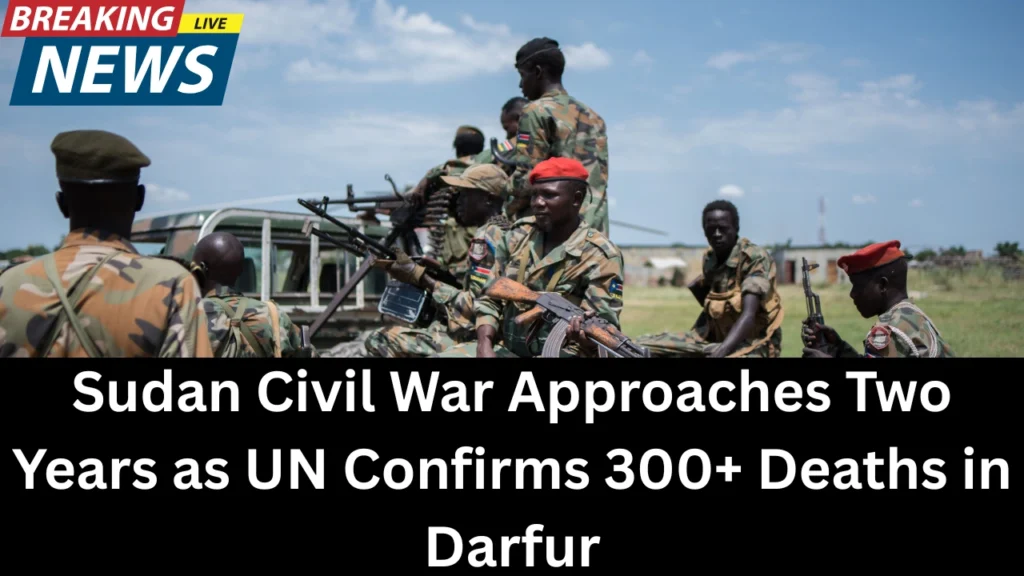As the brutal civil war in Sudan approaches its grim two-year milestone, the United Nations has confirmed that more than 300 civilians were killed in just two days of fighting in the Darfur region, marking one of the deadliest episodes in a conflict that has already displaced millions and caused massive humanitarian devastation.

The UN Office for the Coordination of Humanitarian Affairs (OCHA) released the updated death toll on Monday, citing unnamed local sources. The attacks, carried out by Sudan’s powerful paramilitary force, the Rapid Support Forces (RSF), targeted two displacement camps in North Darfur and areas surrounding the regional capital, El Fasher, on Friday and Saturday.
Initially, UN officials had reported over 100 deaths, including 20 children and nine aid workers, but the new figures indicate the violence was even more catastrophic.
Fighting Erupts in Famine-Stricken Camps
The attacks focused on the Zamzam and Abu Shorouk camps—two areas already reeling from famine and disease. According to UN spokesperson Stephane Dujarric, preliminary reports indicate that 10 humanitarian workers from the NGO Relief International were among those killed. They were operating one of the last functional health centers in the Zamzam camp when the assault began.
“This latest wave of violence has devastated vulnerable communities already struggling with food insecurity and displacement,” said Dujarric during a UN briefing.
The International Organization for Migration (IOM) estimates that between 60,000 to 80,000 families were displaced in the past two days alone. Many fled toward El Fasher, one of the few remaining urban areas in Darfur under military, not RSF, control. The city has been under siege by RSF forces for over a year, raising fears of an imminent humanitarian collapse.
Background: Two Years of Civil War
Sudan plunged into full-scale civil war on April 15, 2023, when escalating tensions between the Sudanese Armed Forces (SAF) and the RSF, led by rival generals, exploded into armed conflict in the capital, Khartoum, before spreading rapidly across the country—including the long-volatile Darfur region.
Since then, the war has resulted in at least 24,000 confirmed deaths, though activists estimate the real toll is significantly higher due to underreporting and lack of access to conflict zones. The conflict has left Sudan with the largest displacement crisis in the world, and the only active famine declaration globally, according to humanitarian organizations.
UN Calls for Global Action
In response to the recent surge in violence, the UN Security Council has scheduled emergency closed-door consultations on Tuesday, the war’s anniversary.
Also on Tuesday, a donor conference in London—organized by Germany, France, the European Union, and the United Kingdom—will aim to increase international pressure for peace and highlight the scale of the humanitarian crisis. Over 20 foreign ministers and representatives from global organizations are expected to attend.
“The United Nations wants this conference to be a moment of unity,” said Dujarric. “It is time for Sudan’s neighbors and the international community to move toward peace instead of fueling conflict.”
Displacement at Record Highs
The scale of the crisis is staggering. According to the UN Refugee Agency (UNHCR), almost 13 million people have been forced to flee their homes in Sudan—4 million of them seeking refuge in neighboring countries like Chad, South Sudan, Ethiopia, and Egypt. Thousands more have escaped to Libya and Uganda, with rising numbers attempting to reach Europe and the Gulf states.
Speaking via video conference, Mamadou Dian Balde, the UNHCR’s regional director, warned:
“We are witnessing massive human rights violations, a humanitarian collapse, and a region in need of urgent international attention. Without immediate funding, the risk of onward migration toward southern Africa, the Gulf, and Europe increases.”
UNHCR’s $1.8 billion appeal for Sudanese refugees remains only 10% funded, creating a dangerous funding gap just as the situation grows more dire.
RSF Expands Control After Khartoum Loss
The RSF’s brutal attacks in North Darfur follow a major symbolic defeat late last month, when Sudan’s military regained control of Khartoum. Analysts believe the RSF’s latest actions may be a retaliatory response to that loss, aimed at consolidating territorial control in western Sudan.
Darfur, already known for ethnic violence and past genocidal campaigns, has become a flashpoint once again. The RSF has been accused of targeting civilians along ethnic lines, particularly in the Masalit community, and employing tactics that include sexual violence, arson, and blockades of humanitarian aid.
Aid Workers Among the Dead
Among the over 300 victims were 10 humanitarian aid workers from Relief International, operating under extreme conditions in one of the few health centers still functioning in the Zamzam camp. Their deaths mark one of the worst single-day losses for aid workers in Sudan since the conflict began.
“Our colleagues were there to serve the most vulnerable,” said a Relief International spokesperson. “Their deaths are a sobering reminder of the risks humanitarian workers face in conflict zones.”
Road Ahead
Despite mounting calls for peace, Sudan’s warring factions remain deeply entrenched, and diplomatic efforts have made little headway. The international community faces increasing pressure to:
- Enforce humanitarian corridors
- Impose targeted sanctions
- Broker a ceasefire through regional powers
With no end to the conflict in sight, the people of Sudan—particularly in Darfur—face a future marked by hunger, displacement, and trauma.
Conclusion
As the second anniversary of Sudan’s civil war approaches, the world is confronted with an urgent and growing humanitarian catastrophe. The UN’s confirmation of 300+ deaths in Darfur over just two days is a stark reminder that this is not merely a political conflict—it is a human tragedy of immense proportions.
With nearly 13 million displaced, thousands dead, and famine spreading, the situation in Sudan is one of the most severe crises of our time. As global leaders gather in London, the world watches to see whether words will finally turn into action to save Sudan from total collapse.
